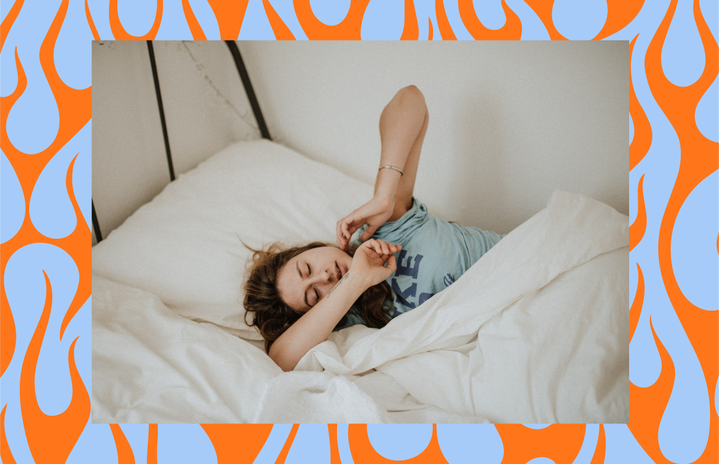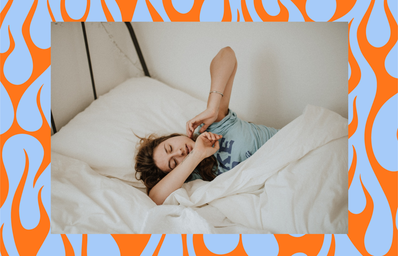Your 20s are a transformational time in your life, which might come with transformations in your mental health, physical appearance, or internal health. These changes are often regarded as mid-20s puberty, or second puberty.
The phrase started trending on social media in 2021 when Twitter users were freaking out about having a “second puberty,” while other users claimed that it doesn’t exist. Recently, TikTok users have brought the phrase back up as they discuss the changes they have been enduring in their mid-20s that look similar to their first puberty, such as weight gain and acne.
The thought of another puberty might be terrifying, I know. However, changes to your body are completely natural at whatever age you are. Though it might be scary, understanding what second puberty entails might lessen the fear. So, I talked to a doctor to see if mid-20s puberty is real, and what changes you can expect when it comes.
Dr. Sam Rahman, a board-certified OB/GYN, tells Her Campus, “Medically speaking, puberty is the physical transition that occurs during adolescence that leads to developing secondary sexual characteristics and reproductive capacity. There is also psychosocial maturation and changes in cognition that occur.”
Therefore, a medically-defined second puberty often occurs for transgender individuals who are transitioning because they are going through reproductive changes. However, all bodies still go through changes in your 20s, which is why social media has adopted the term “mid-20s puberty.”
Dr. Rahman continues, “Second puberty, medically speaking, does not exist for cisgendered individuals. It is a colloquial term that went viral through social media platforms based on changes that were occurring to people as a natural part of aging. We have natural, age-related changes in our 20s, 30s, and 40s, and for people with uteruses, the 40s are the most significant changes that lead into menopause when hormones significantly decline.”
Hormones are at the root of bodily changes you might experience in your 20s.
According to Cosmopolitan, women in their 20s have an increase in estrogen and progesterone, which can lead to internal changes in the body. Dr. Rahman explains, “… This can contribute to your bone mass being at a maximum, your muscle strength also being maximum.”
Some aspects of your first puberty can also be seen in the changes you experience in your 20s, such as acne. “Studies have demonstrated that people with ovaries, due to maximum levels of estrogen, stressors, poor eating habits, lack of sleep, and alcohol/drug use, can develop acne again with 45% of females between the ages of 21-26 developing acne,” says Dr. Rahman.
Another change you might experience is weight gain, but this is completely normal as your body might go through stress during this time in your life. Dr. Rahman explains, “Weight gain can also be a significant concern, particularly with changes in our hormonal milieu, genetic predisposition with conditions like PCOS (Polycystic Ovarian Syndrome), poor lifestyle decisions (poor sleep hygiene, poor diet, lack of exercise), and increase in stress.”
Hormones in your 20s might cause your periods to become regular, and your cycle to become more predictable. However, this isn’t the case for everyone, so don’t be concerned if your cycle isn’t regular when you hit your 20s.
External factors might contribute to mental health changes in your 20s.
Your 20s might be filled with newfound responsibilities, which can impact your mental well-being. Dr. Rahman says, “There are psychosocial stressors that come from ‘adulting.’ Living independently, navigating friendships and relationships, determining a career path, partying too much, or working too hard or too little, are a whole spectrum of things that come up for people in their 20s that stress your normal system and sometimes can lead to depression and anxiety.”
In a 2020 study done by the Substance Abuse and Mental Health Services Administration, research showed that 30.6% of individuals in their 20s experience mental illness. The most common mental health issues are anxiety, depression, and body image issues. Your mental well-being might struggle during these changes, but there are ways to combat the onset of mental health concerns.
Though these changes might be inevitable, there are ways to cope.
Your 20s might be the best years of your life or the most tumultuous. Whatever your 20s bring you, it’s important to have a support system by your side. Dr. Rahman advises that establishing a support network, whether that be through therapy, family, or friends, will help you get through these unexpected changes. She also explains that it’s important to prioritize our well-being and this can look like meditating or regulating your sleep schedule.
She continues, “There is definitely a connection with the fuel we put into our bodies and how it impacts our gut-brain axis and we have to be more aware of this. Additionally, if therapy is not available or enough, medications sometimes become necessary and there is no shame in that! It is important to seek help from a healthcare provider that is going to listen to your concerns, and you have to advocate for your own health and mental well-being.”
Mid-20s puberty is a colloquial term that is coined to explain what our bodies go through as we transition into different stages of our lives. Though it might not be a medical phenomenon, there is no denying that different ages cause different changes within our bodies. It might be scary, but changes to your body are completely natural and is a common experience for many.


